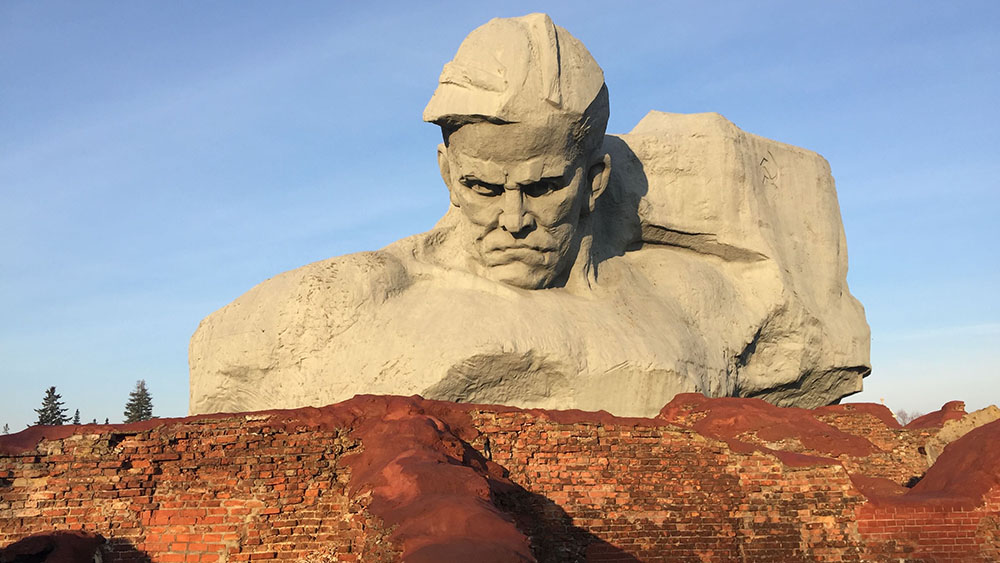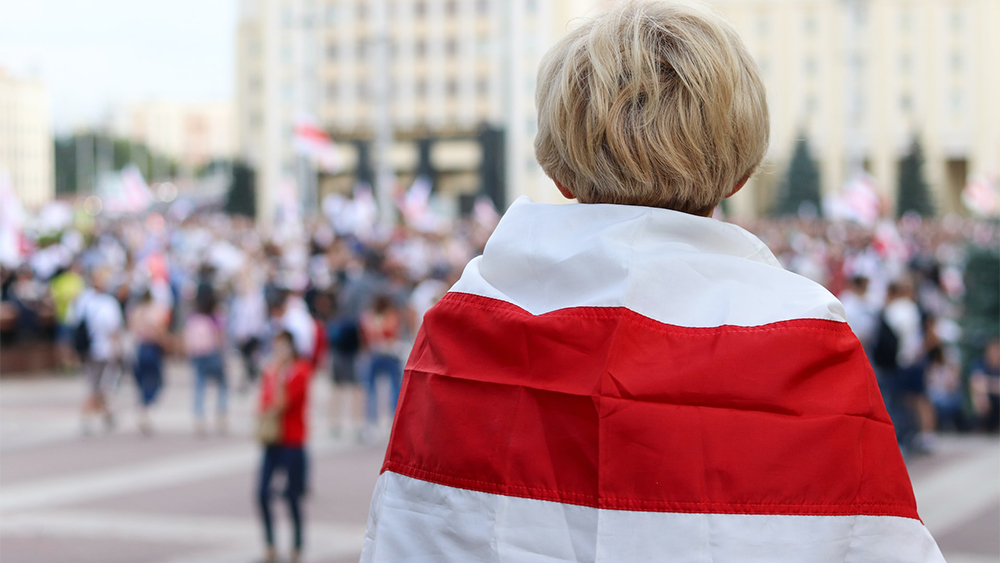Ihar Sluchak was banned from his profession, lost all property, and was forced to become a refugee just for protecting the Belarusian language. Still, he keeps on fighting.
Ihar Sluchak is a Belarusian lawyer and activist. For many years, he has been engaged in the protection of the Belarusian language through appeals to state bodies. After the presidential elections of 2020, massive political repressions began in Belarus, which also affected Ihar. The activist and his family were forced to hide from persecution, often changing their residence. For a long time, he continued his human rights activities in the country, but with the emergence of new threats, he was forced to leave his homeland.
Belarusian journalist Katsiaryna Lutsevich spoke with Ihar about the risks and prospects of language activism in the homeland and in exile.
– What risks have you faced through the protection of the Belarusian language?
– In Belarus any human rights activity attracts negative attention from the representatives of the current political regime.
– I started protecting the rights of the Belarusian language and Belarusian-speaking Belarusians while studying at the university. Even then, the representatives of the security officials informed me that I would not have the opportunity to work as a lawyer in my country. And indeed: I am a lawyer, a Master of Legal Sciences, who received education both in Belarus and abroad, I was not in demand in Belarus. At that time, my fellow classmates work today as judges, prosecutors, investigators, and carry out repression against the Belarusians. After all, their behavior and outlook coincide with the behavior and outlook of the current political regime.
– The lack of a job in my specialty constantly forced me to take any other job, including non-specialty, in order to make a living. And even if this work was in the field of jurisprudence, it was not officially declared. That is, if you are an independent Belarusian lawyer, you cannot have professional experience, grow professionally in state institutions, and you are not protected in any way – you do not have a decent salary, decent working conditions, social protection in the form of a pension, or sick leave. An independent lawyer in Belarus has a ban on the profession.
– For my human rights activities, I received not only a ban on my profession, but also direct political persecution until 2020. There was always attention from the security forces, I was detained several times. Back in 2011, I was imprisoned for several days for planning to hold a public event to discuss the situation with the Belarusian language in Belarus.

– After 2020, legal default occurred in Belarus, and the threat of criminal prosecution loomed. My two small children and I could not live in our house and at other addresses known to the special services, because they periodically came there to find us and arrest us. That is why I had to live underground in Belarus for 3 years, constantly changing my place of residence, not being able to receive medical care, limiting myself in the use of means of communication and having many other restrictions. I had to quickly sell a private house at a non-market price, because I needed funds to live in Belarus.
– In the fall of 2023, it became very difficult to live illegally, political persecution intensified, and our social networks began to be recognized as extremist materials. Our children grew up, they needed kindergarten and vaccinations. That is why I was forced to leave Belarus.
– Thus, I was politically persecuted, got a ban on my profession, lost all my property, and was forced to become a refugee for the protection of Belarusian language.
Can we say that Belarusian-speaking citizens living in Belarus are an unprotected group?
– Yes, Belarusian-speaking Belarusians living in Belarus are a vulnerable group. People cannot receive preschool and school education entirely in Belarusian, especially in cities. There is no special or higher education in the Belarusian language. The absolute majority of communication with state structures is not done in Belarusian. The Belarusian language is minimally presented in the sphere of healthcare and services. In jurisprudence, only slightly more than 1% of legal acts are written in Belarusian.
– The state language policy of the current political regime is focused on supporting the Russian language, as the regime is focused on Russia. Therefore, it is either inconvenient, impossible, or dangerous for Belarusian-speaking people to use the Belarusian language. Belarusian people were forcibly russified due to the fact that they were deprived of the opportunity to use their national language, and the Russian language was imposed by the state through administrative methods – the closure of Belarusian-language schools and other measures.

– Those Belarusians who continue to use the Belarusian language cannot receive return communication, especially in relations with the state, in their own language. There is no Belarusian language infrastructure, Belarusian language ecosystem. It is now difficult and inconvenient to use the Belarusian language in Belarus. Belarusian-speaking people constantly experience stress and difficulties because of this. They are perceived as those who are against the regime, as opposition. The fact that you speak Belarusian in a public place can draw attention to you from the police and they can detain you. When you speak Belarusian, state officers can beat you or put you to death in prison.
What are you doing to support the Belarusian language outside Belarus?
– I write appeals, as a result of which the Belarusian language continues to appear on goods, signs, posters, and websites. I continue to promote changes in the legislation. I advise people facing language discrimination. I talk about the language situation in social networks for Belarusians and foreigners. I am working on a new book on the problem of statehood and discrimination of the Belarusian language.
– I am engaged in the same work to protect the right to the native language as in Belarus, but technically it is different. Unfortunately, I cannot reveal the details for security purposes.
– Taking advantage of the fact that the Belarusian language is still formally the official language in Belarus, I appeal to my opponents with proposals to use the Belarusian language more widely in their sphere of responsibility. I expose cases of direct aggression against the Belarusian language and Belarusian-speaking Belarusians and demand that it be stopped. This work is directed specifically to Belarus. The volume and quality of work did not change much due to the fact that I was forced to leave Belarus. It was just important to me to be on my land.
– As for abroad, where I am today, I see that many diasporas do not have adequate protection of their linguistic rights from the states where they live. First of all, there is a problem with school and preschool education in the native language, namely its almost absence. This is a big problem, because children cannot receive education in their native language, and in this way we can talk about forced assimilation, loss of their language and national identity. This problem is also my area of interest.
What is the most difficult for you: to continue your activity abroad, or to do it at home with the risk of being repressed?
– There are difficulties in both the first and second cases. By engaging in human rights activities in Belarus today, you are close to your people on your land. You have more moral authority to counsel people because you are physically near them. But every second you have tension and stress because of the threat of being arrested, losing your health or life every day.

– You are physically safer abroad. But in one’s own land, there is a great risk of being detached from the Belarusian context, from understanding what is happening in the country and how people live there. It is not always easy to see the problems where more attention and efforts need to be applied, and you do not see the results of your work as you would see them if you were in your homeland.
– In the sphere of language rights protection, my methods can be used to change the situation in almost the same way, whether in Belarus or abroad. And in other spheres, especially in politics, it is unreal. Without being in the country, it is impossible to change the political situation in the country. Well, personally, I am very hurt and sad that I am not in my homeland and not with my people.
Katsiaryna Lutsevich
Student of Political Science in EHU, Vilnius
Background: Why language matters
Belarusian is one of three languages in the East Slavic group. The other members of the group are Ukrainian, a close relative of Belarusian, and Russian, the most widely spoken of the 20 estimated Slavic or Slavonic languages. Belarusians have historically lived alongside people who would have spoken Polish, Ukrainian, Lithuanian, Yiddish and Russian.
Russian and Belarusian technically enjoy equal status as official languages of state since the Lukashenka rule, and Belarusian language became more marginalized. The World Atlas of Languages, a survey maintained by the UN’s cultural agency, UNESCO, has categorized Belarusian as potentially vulnerable within Belarus – it is not in imminent danger but nor is its survival assured.
Read also


